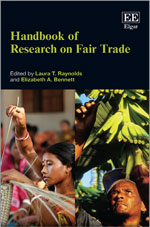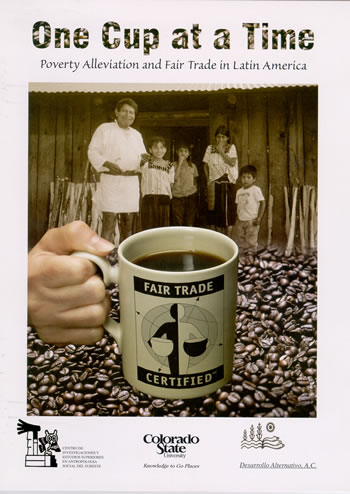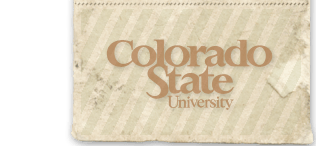Center for Fair & Alternative Trade
Key Publications
Handbook of Research on Fair Trade, Laura T. Raynolds & Elizabeth A. Bennett (Eds), Edward Elgar, 2015.
Fair trade crit iques the historical inequalities inherent in international trade and seeks to promote social justice by creating alternative networks linking marginalized producers in the global South with progressive consumers in the North. The first of its kind, this volume brings together 43 of the world’s foremost fair trade scholars from across the social sciences to synthesize existing research, evaluate key debates and identify critical questions. The Handbook serves as both a comprehensive overview and in-depth guide to dominant perspectives and concerns. Chapters analyze the rapidly growing fair trade movement and market, exploring diverse initiatives and organizations, production and consumption regions, and food and cultural products. Written for those new to fair trade as well as those well versed in this domain, the Handbook is an invaluable resource for scholars and practitioners interested in global regulation, multi-stakeholder initiatives, ethical labeling, social and environmental certification, consumer activism, and international development.
iques the historical inequalities inherent in international trade and seeks to promote social justice by creating alternative networks linking marginalized producers in the global South with progressive consumers in the North. The first of its kind, this volume brings together 43 of the world’s foremost fair trade scholars from across the social sciences to synthesize existing research, evaluate key debates and identify critical questions. The Handbook serves as both a comprehensive overview and in-depth guide to dominant perspectives and concerns. Chapters analyze the rapidly growing fair trade movement and market, exploring diverse initiatives and organizations, production and consumption regions, and food and cultural products. Written for those new to fair trade as well as those well versed in this domain, the Handbook is an invaluable resource for scholars and practitioners interested in global regulation, multi-stakeholder initiatives, ethical labeling, social and environmental certification, consumer activism, and international development.
“This Handbook brings together an excellent set of critical contributions at the cutting edge of research on fair trade. They provide a wide range of perspectives and insights into different conceptual approaches and empirical case studies…vital reading for all academics, students and practitioners with an interest in fair trade.”– Stephanie Barrientos, University of Manchester.
“This is an important contribution to building the research field of fair trade globally… a state-of-the-art account of this most significant sector within ethical consumption”– Alex Nicholls, University of Oxford.
“This handbook is a long-needed, comprehensive examination of fair trade’s multifaceted and shifting coordinates by leading scholars from a wide range of disciplines. An invaluable resource for researchers and students alike.”– Daniel Jaffee, Portland State University.
“Raynolds and Bennett have done a major service with this excellent handbook… offers wide-ranging insights from top experts concerned with theory and practice, and careful attention to fair trade’s gains and losses…bound to be a cornerstone for the next phase of fair trade work and research.”– Gavin Fridell, Saint Mary’s University.
Download the Introduction Chapter for Free
For More Information and To View the Table of Contents
———————————-
Raynolds, Laura T. 2012. “Fair Trade: Social Regulation in Global Food Markets.” Journal of Rural Studies 28 (3): 276-287.
This article analyzes the theoretical and empirical parameters of social regulation in contemporary global food markets, focusing on the rapidly expanding Fair Trade initiative. Fair Trade seeks to transform North / South relations by fostering ethical consumption, producer empowerment, and certified commodity sales. This initiative joins an array of labor and environmental standard and certification systems which are often conceptualized as “private regulations” since they depend on the voluntary participation of firms. I argue that these new institutional arrangements are better understood as “social regulations” since they operate beyond the traditional bounds of private and public (corporate and state) domains and are animated by individual and collective actors. In the case of Fair Trade, I illuminate how relational and civic values are embedded in economic practices and institutions and how new quality assessments are promoted as much by social movement groups and loosely aligned consumers and producers as they are by market forces. This initiative’s recent commercial success has deepened price competition and buyer control and eroded its traditional peasant base, yet it has simultaneously created new openings for progressive politics. The study reveals the complex and contested nature of social regulation in the global food market as movement efforts move beyond critique to institution building.
– One of the journal’s top cited articles, nearing 100 citations.
———————————-
Raynolds, Laura T. 2009. “Mainstreaming Fair Trade Coffee: From Partnership to Traceability.” World Development. 37 (6): 1083-1093, 2009.
This article analyzes the recent growth of Fair Trade and the mainstreaming of this previously alternative arena. Focusing on coffee, I identify a continuum of buyers ranging from ‘‘mission-driven” enterprises that uphold alternative ideas and practices based on social, ecological, and place-based commitments, to ‘‘quality-driven” firms that selectively foster Fair Trade conventions to ensure reliable supplies of excellent coffee, to ‘‘market-driven” corporations that largely pursue commercial/industrial conventions rooted in price competition and product regulation. Using a commodity network approach, my analysis illuminates the impacts of diverse buyer relations on producer groups and how relations are in some cases shifting from partnership to traceability.
– The journal’s 5th most cited article, with over 300 citations.
———————————-
Fair Trade: The Challenges of Transforming Globalization, edited by Laura T. Raynolds, Douglas L. Murray, and John Wilkinson, London, Routledge. 2007
Fair Trade is expanding rapidly around the world. This movement offers important opportunities for empowering producers and alleviating poverty in the global South and for increasing Northern consumer consciousness and action promoting global social justice. Yet, the expansion of Fair Trade into new types of commodities, production regions, and retail venues is raising important new challenges. How can Fair Trade face the challenges ahead and fulfill its promise, broadening and deepening its positive impacts now and in the future?
Our research reveals the challenges that Fair Trade faces in its effort to transform globalization, emphasizing the inherent tensions of working both in and against the market. The volume explores Fair Trade’s recent rapid growth into new production regions, market arenas, and commodity areas through case studies of Europe, North America, Africa and Latin America undertaken by prominent scholars in each region. The authors draw on, and advance, global commodity and value chain analysis, convention, and social movement approaches through these case studies and a series of synthetic analytical chapters. Pressure for both more radical and more moderate approaches compete within the movement’s historical vision, reshaping Fair Trade’s priorities and efforts in the Global North and South.
For a summary of our conclusions, see our Policy Brief: “The Fair Trade Future.” Policy Innovations, January 31, 2008. New York: Carnegie Council.
———————————-
Raynolds, Laura T. 2004. “The Globalization of Organic Agro-Food Networks.” World Development 32 (5): 725-743.
This article analyzes the booming world trade in organic agro-foods such as tropical products, counterseasonal fresh produce, and processed foods. Research focuses on expanding South–North networks linking major US and European markets with major production regions, particularly in Latin America. Employing a commodity network approach, I analyze organic production, distribution, and consumption patterns and the roles of social, political, and economic actors in consolidating international trade. Organic certification proves central to network governance, shaping product specifications, production parameters, and enterprise participation. My analysis identifies key contradictions between mainstream agro-industrial and alternative movement conventions in global organic networks.
– This highly influential article has been cited over 500 times.
———————————-
One Cup at a Time: Poverty Alleviation through Fair Trade in Latin America, prepared by Douglas Murray, Laura T. Raynolds, and Peter Leigh Taylor. 2003.

What are the real benefits of the Fair Trade movement for producers? Can the benefits of Fair Trade for coffee farmers be sustained over time and expanded to encompass a greater number of farmers and communities?
Addressing these critical questions, we summarize the results of one of the first studies of Fair Trade’s impacts on producers, their cooperatives, and their communities. Drawing on field based research, One Cup at a Time: Poverty Alleviation through Fair Trade in Latin America, prepared by Douglas Murray, Laura T. Raynolds, and Peter Leigh Taylor, identifies the similarities and differences in the experiences ofseven Fair Trade certified coffee cooperatives in Mexico, Guatemala, and El Salvador.
In addition to the summary document, project background reports and commissioned case studies are available:
Background Paper: Existing Research and Critical Issues, By Laura Raynolds
Research Question Findings: Synthesis Report, By Peter Leigh Taylor
Las Colinas and El Sincuyo, Tacuba, El Salvador, By V. Ernesto Méndez
La Voz, San Juan de La Laguna, Guatemala, By Sarah Lyon
UCIRI, Oaxaca, Mexico, By Franz VanderHoff Boersma
CEPCO, Oaxaca, Mexico, By Josefina Aranda and Carmen Morales
Unión Majomut, Chiapas, Mexico, By Victor Pérezgrovas Garzaand Edith Cervantes Trejo
Unión La Selva, Chiapas, Mexico, By Alma Amalia González Cabañas
Tzobolotic Coffee Coop, Chiapas, Mexico, By Maria Elena Martinez
Commentary Comments on the Mexico Reports, By Ronald Nigh
———————————-
Raynolds, Laura T. 2002. “Consumer/Producer Links in Fair Trade Coffee Networks.” Sociologia Ruralis 42 (4): 404-424.
This article analyzes the multifaceted connections linking consumers and producers in expanding North/South Fair Trade coffee networks. I develop a commodity network framework that builds on the commodity chain tradition, integrating insights from cultural studies, actor–network theory, and conventions approaches. This framework illuminates how material and ideological relations are negotiated across production and consumption arenas. In the case of Fair Trade, progressive ideas and practices related to trust, equality, and global responsibility are intertwined with traditional commercial and industrial conventions. As I demonstrate, the negotiation of these divergent conventions shortens the social distance between Fair Trade coffee consumers and producers. I conclude that by re–linking consumers and producers, commodity network analysis provides a robust entré for academic inquiry and engagement in alternative food politics.
– One of the journal’s top five most read articles, cited nearly 600 times.
———————————-
Raynolds, Laura T. 2000. “Re-embedding Global Agriculture: the International Organic and Fair Trade Movements.” Agriculture and Human Values 17(3): 297-309.
The international organic agriculture and fair trade movements represent important challenges to the ecologically and socially destructive relations that characterize the global agro-food system. Both movements critique conventional agricultural production and consumption patterns and seek to create a more sustainable world agro-food system. The international organic movement focuses on re-embedding crop and livestock production in “natural processes,” encouraging trade in agricultural commodities produced under certified organic conditions and processed goods derived from these commodities. For its part, the fair trade movement fosters the re-embedding of international commodity production and distribution in “equitable social relations,” developing a more stable and advantageous system of trade for agricultural and non-agricultural goods produced under favorable social and environmental conditions. The international market for both organic and fair trade products has grown impressively in recent years. Yet the success of these movements is perhaps better judged by their ability to challenge the abstract capitalist relations that fuel exploitation in the global agro-food system. While the organic movement currently goes further in revealing the ecological conditions of production and the fair trade movement goes further in revealing the social conditions of production, there are signs that the two movements are forging a common ground in defining minimum social and environmental requirements. I argue from a theoretical and empirical basis that what makes fair trade a more effective oppositional movement is its focus on the relations of agro-food trade and distribution. By demystifying global relations of exchange and challenging market competitiveness based solely on price, the fair trade movement creates a progressive opening for bridging the widening North/South divide and for wresting control of the agro-food system away from oligopolistic transnational corporations infamous for their socially and environmentally destructive business practices.
– The journal’s most cited article, referenced nearly 700 times.

 To order…
To order…